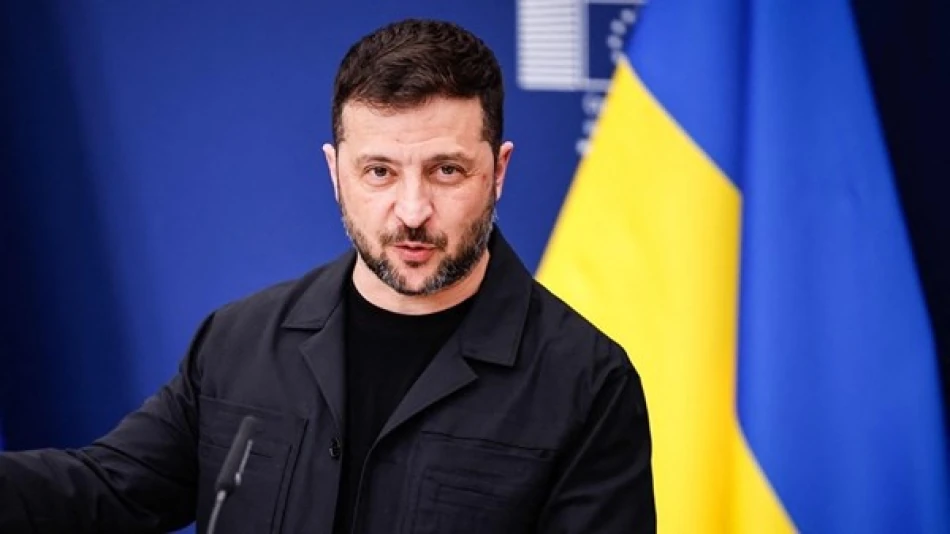
Ukrainian President Dispatches Negotiators to New York for High-Stakes Security Talks
Ukraine Sends Top Negotiators to US as Security Guarantee Talks Intensify
Ukrainian President Volodymyr Zelensky is dispatching his most senior negotiators to New York this week for critical discussions on security guarantees with US officials, signaling a potential shift toward more concrete diplomatic engagement as the war with Russia approaches its third year. The high-level meeting, confirmed by US Special Envoy Steve Witkoff, comes at a pivotal moment when both sides appear to be positioning for eventual negotiations.
High-Stakes Diplomatic Mission
Zelensky announced during his Wednesday evening address that Presidential Chief of Staff Andriy Yermak and former Defense Minister Rustem Umerov will meet with American officials in New York on Friday. The choice of negotiators is significant—Yermak has been Zelensky's closest advisor throughout the conflict, while Umerov's military expertise suggests discussions will focus heavily on concrete security arrangements.
The timing coincides with mounting pressure from the incoming Trump administration for a negotiated settlement, creating urgency around Ukraine's need to secure ironclad security commitments before any potential ceasefire.
The Security Guarantee Challenge
Beyond NATO Membership
Ukraine's pursuit of security guarantees reflects the complex reality that NATO membership—long seen as the ultimate security solution—remains politically unfeasible in the near term. Instead, Kiev is likely seeking a package of bilateral security agreements, weapons commitments, and deterrence mechanisms that could provide similar protection without formal alliance membership.
This approach mirrors successful models like the US-Israel relationship or security partnerships with South Korea and Japan, where comprehensive defense cooperation exists outside NATO's Article 5 framework.
Precedents and Parallels
The negotiations echo historical precedents where countries emerging from conflict required external security guarantees to maintain stability. Finland's post-WWII neutrality arrangement and Austria's 1955 State Treaty both involved complex security assurances that balanced competing great power interests while preserving sovereignty.
Strategic Implications for All Parties
US Perspective
For Washington, these talks represent an opportunity to craft a sustainable security architecture that deters future Russian aggression without direct military confrontation. The Biden administration's approach has emphasized long-term commitments, while the incoming Trump team appears focused on immediate conflict resolution.
The challenge lies in designing guarantees robust enough to satisfy Ukraine while avoiding automatic escalation mechanisms that could draw the US into future conflicts.
Russian Calculations
Moscow's acceptance of any security guarantee framework will likely depend on limitations placed on Ukraine's military capabilities and Western presence. Previous Russian demands have included caps on troop levels, restrictions on certain weapons systems, and constraints on foreign military bases.
Market and Economic Ramifications
Financial markets are closely watching these diplomatic developments, with Ukrainian bonds and regional energy prices reflecting optimism about potential conflict resolution. However, the sustainability of any agreement will ultimately depend on enforcement mechanisms rather than paper commitments.
European defense contractors and energy companies are particularly focused on whether security guarantees might include industrial cooperation components, potentially creating new market opportunities while rebuilding Ukraine's defense capabilities.
The Path Forward
These New York talks likely represent preliminary discussions rather than final negotiations, but they signal a crucial shift from purely military to diplomatic solutions. The success of any security guarantee framework will depend on three key factors: verifiable enforcement mechanisms, sustainable funding commitments, and Russian acceptance of Ukraine's continued sovereignty.
The real test will come not in crafting elegant diplomatic language, but in creating deterrence structures that convince Moscow that future aggression would be prohibitively costly while assuring Ukraine that its independence remains secure.
Most Viewed News

 Layla Al Mansoori
Layla Al Mansoori






